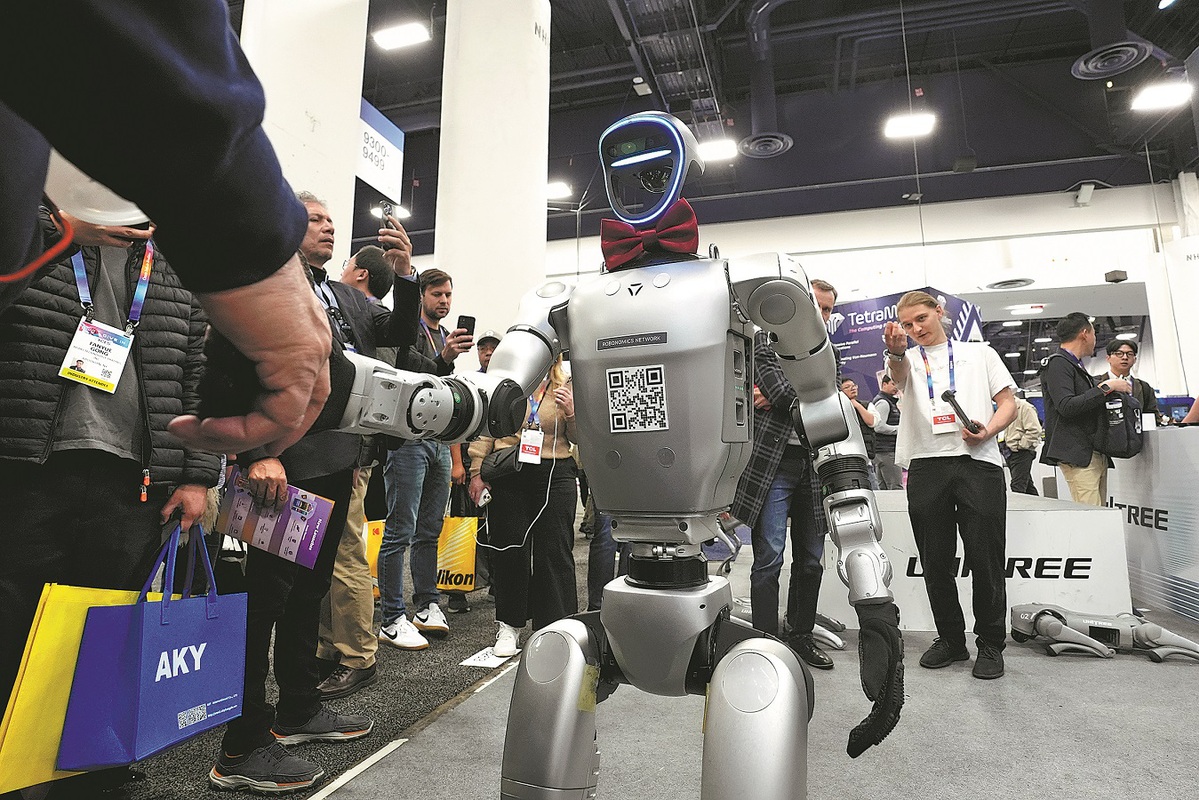Chinese companies shine at world's premier tech show

Chinese technology companies are in the spotlight at the 2025 Consumer Electronics Show, the world's premier tech show, in Las Vegas in the United States, as they showcase their latest technological achievements and innovative products, including semiconductor displays, smart homes, wearable devices and robots.
Nearly 1,500 Chinese enterprises are participating in the event, which runs from Tuesday to Friday, accounting for more than 30 percent of the total registered exhibitors.
Experts said that this robust participation highlights Chinese companies' growing strengths and independent innovation capabilities in cutting-edge technologies and emerging fields.
They added that the presence of Chinese companies at CES demonstrates that they are not only playing an increasingly vital role in spearheading the revolution in the global consumer electronics industry, but are also striving to expand their presence in overseas markets despite the US crackdown and sanctions on China's high-tech sector.
Artificial intelligence-powered terminal devices have attracted attention during this year's event.
Chinese display panel manufacturer BOE Technology Group launched an array of new technologies and products, including a 31.6-inch slidable organic light-emitting diode display, a vehicle-mounted screen with foldable and curved functions, and an AI-powered smart cockpit.
Liu Zhiqiang, senior vice-president and chief technology officer of BOE, said the application of AI technology in display products will make the devices more intelligent and suitable to more usage scenarios, adding that the company will continue to invest in AI.
Chinese consumer electronics maker TCL showcased a diverse range of innovative gadgets, such as QD-Mini LED TVs, mobile phones, tablets, smart projectors and augmented reality glasses, as well as AI-enabled companion robots.
"The true value of AI lies in its application," said Li Dongsheng, founder and chairman of TCL Technology Group, emphasizing that the company will focus on building core AI capacities, making technological breakthroughs and expanding its global footprint.
He estimated that the company's revenue in North America will see 30 percent year-on-year growth in 2025.
A China-made "Land Aircraft Carrier" has attracted lots of attention. The vehicle, from Chinese electric vehicle maker Xpeng Motors' flying car unit Xpeng Aeroht, made its international debut at CES 2025.
With over 3,000 orders secured, the flying car is positioned to become the world's first mass-produced vehicle of its kind, with deliveries slated for 2026.
Zhu Keli, founding director of the China Institute of New Economy, said the strong participation of Chinese enterprises at CES 2025 is a testament to China's increasing technological prowess and competitiveness on the global stage.
"As the world's biggest consumer electronics show, CES provides a valuable platform for Chinese enterprises to showcase their latest breakthroughs in world-leading technologies and make forays into the international market," Zhu said.
Zhu added that through participation in the exhibition, these companies can learn about the latest industry trends and market demand, enhance brand awareness and influence, better integrate into global industrial and supply chains, and take part in global governance in the tech domain.
Chinese home appliance manufacturer Hisense unveiled a 116-inch Mini LED TV equipped with its self-developed AI image chips, which will achieve mass production in March.
Augmented reality goggles and robots have gained a strong foothold during the show. Chinese AR company Xreal displayed its latest AR-powered glasses with enhanced entertainment and gaming AR capabilities, while Dreame Technology presented its robotic vacuum cleaners and window-cleaning robots.
Robotics technology company Segway-Ninebot showcased more than 20 products including smart robotic mowers, electric scooters and e-bikes. The company said it hopes to gain insights from global users and expand its presence in the global market via CES.
Chinese companies are diversifying their overseas strategies, with product portfolios expanding from traditional PCs, smartphones and tablets to emerging AI-powered intelligent terminal devices, such as AR glasses, robot vacuum cleaners and smart home equipment, which will become a new growth driver for the consumer electronics industry, said Wang Jiping, vice-president of market research company IDC China.
Wang noted that domestic enterprises are constantly upgrading their products and technologies in an attempt to satisfy the increasingly diversified needs of global consumers and gain a bigger slice of the midrange to high-end overseas market.
Hong Yong, an associate researcher at the Chinese Academy of International Trade and Economic Cooperation, said Chinese companies are at the global forefront of technological innovation, and have made remarkable progress in tech frontiers, such as AI, AR and robotics. The move will be conducive to driving the transformation from "Made in China" to "Created in China", he added.
